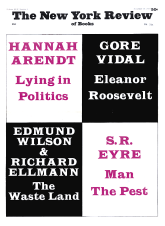In response to:
Rowe's Symbols from the October 7, 1971 issue
To the Editors:
Vladimir Nabokov’s entertaining review of my Nabokov’s Deceptive World (NYR October 7) raises a difficult question. Is is possible for a critic to undertake explication of a highly complex creative mechanism without occasionally bruising or even crushing its soft, sensuous and richly delicate effects? To whatever extent I have trampled upon the cabbages in Nabokov’s Garden of Delights, I sincerely apologize. I should like to thank him earnestly, moreover, for attacking “my sexual symbols” with atypical near mercy. In polemics involving technical points Mr. Nabokov has no peer, and the purely technical details of his review, as distinguished from the impressions they tend to produce, are quite correct.
Deceptively, the humor of “Rowe’s Symbols” detracts from one of my book’s main points: that Nabokov’s writing is continually enriched by a sexual vibrancy which contributes essentially to its “live iridescence.” (The term is his.) This sexual vibrancy, of course, is only one dimension of Nabokov’s works, which so uniquely evince a mind creating simultaneously in several languages, several literary spheres of reference and on several levels of meaning.
Another problem derives from Mr. Nabokov’s focusing upon the “sexual symbols” he so unselfishly defines as mine. It was not my intention, nor, I think, my accomplishment to discuss “symbols” nearly as exclusively as he deftly maintains. Rather, I attempted to expose the sensual, and often sexual, texture of his prose—to uncover the subtle contours in motion beneath its undulating surface.
It is disturbing, I agree, to have the covers pulled off. But one obtains a better look, for what it is worth, at what was happening, even if the magic is thereupon rudely interrupted. And even if Mr. Nabokov’s “most innocent words,” as he puts it, seem almost more guilty than even Vladimir Nabokov could have intended. Very seldom, it happens that a writer has truly rare genius, wields his abilities with awe-inspiring control, and yet, paradoxically, is as unaware of precisely why his effects are successful as he is of precisely where his gifts came from. This is also a kind of vulnerability, a chink in the writer’s armor of objectivity about his own writing. The method works perfectly, the author senses its special success, but he is nevertheless not fully aware of the nature of some of its mechanisms. In this respect only, the incredibly wide vision and powerful control of genius is paradoxically tinged with the blinding splendor of supreme self-consciousness. Nikolai Gogol was such a writer. Vladimir Nabokov (see the conclusion of my book, where I quote him on his wondrously balanced “mad mind”) may be one too.
The fatal flaw in Mr. Nabokov’s argument is that the sheer weight of evidence, given in my book to demonstrate the relentlessly sexual texture of his writing, finally undermines the delightfully Kinbotelike posture of outraged sensibility he assumes in his review. But however paradoxical or Pyrrhic this posture, it will never diminish my gratitude for the glittering and deceptive world of Vladimir Nabokov’s truly incomparable “arbors and mists.”
Woodin Rowe
This Issue
November 18, 1971



